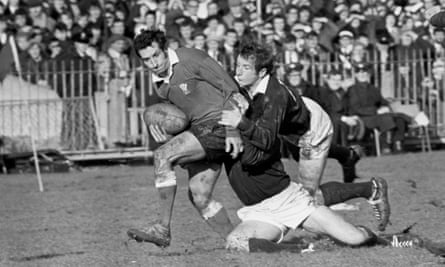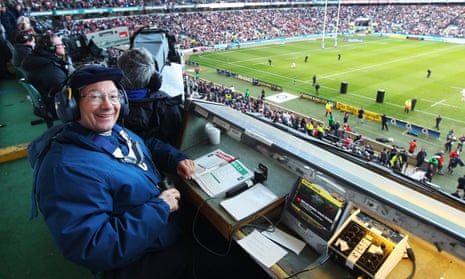It is not easy putting words to televised sporting pictures, let alone painting the whole verbal picture for radio listeners. The temptation is to gabble on, desperately fill the silence and, if all else fails, state the bleeding obvious. To make the whole thing resemble a cosy, fireside chat with close mates is a great deal harder than it seems.
Rugby has been especially lucky with many of its pre-eminent ‘voices’. For years the late Bill McLaren imbued the sport with such warmth, humanity and soul it was almost a surprise when any genuine “argy-bargy” broke out. The “big laddy”, the “boilerhouse”, the “mad trout up a burn”, the garryowen “with snow on it”… even growing up in the south of England you felt a kinship with Galashiels or Hawick or Melrose or Kelso or wherever else in the Borders they were dancing in the streets to mark the debut of the latest Scotland cap.
And now it is almost time to bid farewell to another cherished Caledonian larynx. It is 46 years since Ian Robertson, 73, joined the BBC, which makes him the voice of an awful lot of rugby childhoods, including mine. This year will be his last in the commentary box before he retires to spend more time with his bookmaker and roam the fairways more often. Both, many will claim, are unfeasible goals but Robbo will give it his best shot.
There is also every chance he will pop up behind a microphone somewhere; world-class raconteurs do not tend to fall silent overnight. There has always been an expert touch of the Ronnie Corbetts – “Now where was I? Ah yes, the Hong Kong sevens” – about his story-telling style, to the point where the BBC might yet be well advised to plonk him in an upholstered chair and film him recounting his favourite anecdotes while it still can.
It is also entirely possible many of his listeners have absolutely no idea he played fly-half for Scotland, sharing in their Calcutta Cup win over England in 1970, coached Cambridge University or taught English to a young Tony Blair at Fettes College. They will certainly be unaware of the massive amount of charitable funds he helps to raise, notably on behalf of his friend and former commentary box colleague Alastair Hignell, who continues to battle multiple sclerosis with such inspirational bravery.
A press room without Robbo will certainly be duller; almost as well known as his perfect voiceover of Jonny Wilkinson’s World Cup-clinching 2003 drop-goal in Sydney was his absence of technological savvy. Those charged with looking after him on tour and elsewhere certainly deserved an annual medal. As his long-suffering producer Ed Marriage has recalled, Robbo enjoyed quoting the late BBC football correspondent Bryon Butler’s advice to him on the subject: “Never learn how the broadcast equipment works or they’ll stop sending an engineer or producer with you.”
Those days are gone now and corinthian casuals like Robbo – at one stage he was playing club rugby in Italy at weekends, flying back to London on Sundays and working on the Today programme on a Monday morning – are a fast diminishing breed. It begs the question of what the ideal soundtrack to rugby should now be in an era when former pros tend to outnumber professional broadcasters in many sports.

Some of it is a matter of personal preference but there is no question that fine rugby analysts or co-commentators such as David Flatman, Austin Healey, Ben Kay, Ugo Monye, Jonathan Davies, Stuart Barnes and, over the weekend, Sam Warburton, all have an ability to articulate something the television viewer might not have spotted for him or herself.
There are any number of highly regarded match commentators around, from Alastair Eykyn and Nick Mullins to Miles Harrison, Eddie Butler and Andrew Cotter; rugby is not aways an easy game to sum up instantly and not all the action happens in plain sight.
Evocative old-school voices such as McLaren, Robertson and the late Cliff Morgan, even so, should be for ever cherished. One day prior to an international at Murrayfield Robertson and Hignell took a wrong turn while driving to Scotland training somewhere in the suburbs. Eventually the former flagged down a local bus to ask directions, to which the driver replied: “Are you Ian Robertson off the radio?”
Having established it was indeed the great man he insisted on diverting from his route, regardless of all the passengers on board, to make certain the BBC’s finest made it to the right place at the right time. Great commentary has the power to enrich lives far beyond the mud-spattered touchline.
Ode to Joy
Every passing week seems to see Joy Neville break through another barrier previously blocking the progress of female rugby referees. By all accounts Neville, a former Irish international, had a more than decent game in charge of Ulster v Southern Kings in Belfast, the first time a woman has refereed a male Pro14 league game. Here’s hoping that she – and others – can continue their rise and be appointed to a men’s Six Nations Test in the foreseeable future.
One to watch
The new Super Rugby campaign begins this week, sliding craftily into the gap left by a fallow Six Nations weekend. This year the competition will be a 15-team, three conference affair – having been cut back from the previously unwieldy 18 teams – with eight sides making the final play-offs. It will be a surprise if New Zealand’s leading lights do not dominate again but, above all else, the tournament badly needs to recapture the drifting public imagination.

Comments (…)
Sign in or create your Guardian account to join the discussion